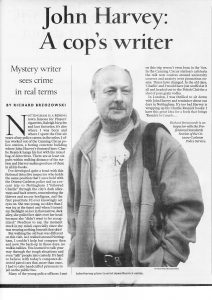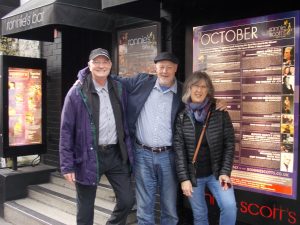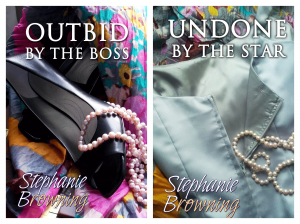The Nottingham Connection…
When I first met Charlie Resnick, John Harvey’s jazz-loving detective inspector, on the page in 1991, I was thrilled. Here was a new series from a British crimewriter I hadn’t read before. Three books in, and I was hooked — on Harvey’s award-winning command of the genre, and on his Nottingham-based copper. For Resnick is the classic loner, weighed down by too many memories and not enough of a personal life. My kind of guy.
By the time Easy Meat came out, the eighth in the series, I was reviewing crime fiction for the Ottawa Citizen, writing mysteries of my own, and about to teach a one-day workshop.
I called it How to get away with murder…in print!
All I had to do was put together a suitable outline knowing that, on the day, I should expect the unexpected. And sure enough, there was this guy, sitting at the back of the room taking notes, and asking questions like “have you ever been in a police station?”. I mumbled something about being in the back of a cruiser once, and next thing I knew he was asking me out to lunch…and taking my fingerprints. As one does on a first date when the officer-in-charge is a detective inspector with the Ottawa Police.
But what happened next is total happenstance. Richard (the aforementioned detective inspector) told me he’d spent his early years with the City of Nottingham. I told him about John Harvey, and then fact and fiction merged. Not only had Richard worked out of the same Canning Circus police station as John Harvey’s fictional detective, they also shared a connection to the Polish Club, Nottingham’s gathering place for the vast numbers of Poles who had remained after World War II. There was nothing for it, but to go to Nottingham, meet the relatives (Richard and I were definitely an item by then) and walk the beat. We made it a working trip, connecting with John when we went back down to London.
It was brilliant. We met at Waterstones in Piccadilly Circus, grabbed a coffee, and talked shop, about crime writing and about the amazing coincidences between Richard’s and Resnick’s backgrounds. Even their take on Nottingham was the same “a gritty  mining town famous for Players’ cigarettes, Raleigh bicycles and lace factories,” tempered by D.H. Lawrence and the legend of Robin Hood.
mining town famous for Players’ cigarettes, Raleigh bicycles and lace factories,” tempered by D.H. Lawrence and the legend of Robin Hood.
When we returned home, Richard wrote a piece for the Ottawa Citizen about “following Charlie” through Nottingham’s dark alleyways and back streets, remembering the thieves and soccer hooligans, and the first prostitute he’d ever set eyes on. “She was young, no older than I was (19 at the time) and when I turned my flashlight on her in that narrow, dark alley, she pulled her skirt over her head because she didn’t want to be recognized.”
He ended the article by suggesting he had a “great idea for a book that brings Resnick to Canada.” It didn’t quite happen that way, but in Darkness, Darkness, John’s twelfth and “final” Resnick published in 2014, he gave a nod to Richard in Chapter 49,
“Resnick had known an inspector in the Notts force who’d gone out to Canada…Brzozowski. Polish descent like himself. Good policeman, good detective. Resnick had liked him. Would have bet good money he’d more often then not got his man, too.”
Or, in this case, woman!

Outside Ronnie Scott’s Jazz Club in Soho, 2016
Over the years, twenty as of this writing, we’ve met up with John whenever possible, sometimes in Nottingham, where lunch at the Warsaw Diner was always a favorite, or in London at Foyles on the Charing Cross Road. Last autumn it was Soho with John bringing us up-to-date on his most recent project: his adaptation of Darkness, Darkness which had just finished its premiere run at the Nottingham Playhouse .
Unfortunately, our timing was off, but with a little luck we’ll be back in England for an early spring, and the release of Body & Soul, John’s fifth “Frank Elder” novel. Totally different series (although Elder is ex-Nottingham, of course!) from a very prolific, and engaging, writer.
Lonely Hearts, John’s first Charlie Resnick novel, was named by the London Times as one of the “100 Best Crime Novels of the Century.” And in 2007, he was awarded the Crime Writers’ Association Cartier Diamond Dagger for Lifetime Achievement.
Body & Soul will be published in hardcover by William Heinemann on April 18th.
John Harvey’s website is: http://www.mellotone.co.uk
The Art of Collaboration!
In the days before writing romances together as Stephanie Browning, Susan Brown and I wrote mysteries for middle-grade readers.

We also co-authored scripts and dabbled in a bit of television, but the following article was, in fact, our first “official” collaborative piece. We wrote it after delivering a workshop at the Detroit Women Writers annual conference, and the rest is, as they say…history.
So where’s ubiquitous?
or
How to maintain the balance of power in a collaboration!

written by Anne Stephenson
(rewritten by Susan Brown; re-edited by Anne Stephenson;
final version by Susan Brown;
last call to the editor by Anne Stephenson)
Not long ago, Susan and I gave a seminar about collaboration to a group of aspiring writers. We called it, “Making Collaboration Work.” A piece of cake. One way or another, we’d been collaborating since we were room-mates at Ottawa’s Carleton University. But this was formal. We divided the research and organization, prepared the same number of handouts, planned the presentation so that we got equal time, and split the fee.
It was great. Our audience was responsive – they laughed in all the right places, asked questions we could answer, and clapped enthusiastically at the end.
Why? Thorough research, of course – but the real learning experience came from watching the finely-tuned dynamics of a working collaboration. We took pot shots at each other the entire time.
When Susan discussed compatible work habits, she called me a neat-freak. The crowd tittered. I countered by pleasantly suggesting she use coasters for her coffee cups instead of our manuscript. She lounged against the wall and assumed an air of long-suffering. The audience lapped it up.
When I pointed out how important it is for each partner to receive a copy of any correspondence with agent or publisher, Susan, who forgets to mail everything that isn’t addressed to an editor, had the grace to blush.
She tried to get me on deadlines. In collaboration deadlines are, of course, sacred. I get writer’s block; the words don’t flow; my muse is off playing squash. Susan gets on the phone claiming she needs Chapter Five, so she can get on with Chapter Six. I tell her I’m still waiting for her edits on Chapter Four.
We went on to discuss how writers often have favorite phrases that grow like toadstools throughout their copy. Susan’s characters “exchange glances” so many times they get cross-eyed, I said. She “looked at me pointedly” and told the group how important it is to edit each other’s work with kid gloves.
Writers have such fragile egos.
We trundled through the legal jungle of what can happen to whom when one makes promises unbeknownst to the other. Susan used several examples of possible scenarios. In every one, I made wildly improbable promises to publishers, was killed in car crashes, skipped the country with head-earned advances, or a combination of all three. She finished with a sweet smile and a somber warning that you must know and trust your collaborator or be left holding the bag.
I’m a reasonable person. It was only in the interest of education that I told them the truth about ubiquitous.
Once the project is finished, I explained, one partner has to do the clean copy and send it in. This is the position of power. In our case, it’s Susan. She nodded modestly. Her computer and printer, I went on, are more sophisticated than mine, so she enters the final draft, prints it, and mails it to the publisher.
And that’s where I lost ubiquitous. Ubiquitous is one of my favorite words. It has tone, it has class; Susan can’t spell it without a dictionary. I had used it to describe Miss Belcher, the teacher who lurks around every corner in our juvenile mystery, The Mad Hacker. Throughout the entire writing and editing process, I had warded off Susan’s attempts to cut that word.
After sending the original to the publisher, she sent me my copy of the manuscript. I was impressed. It was beautiful – no typos, no coffee stains, no ubiquitous.
The audience loved it.
They didn’t, however, hear the last word on ubiquitous. After the conference, Susan and I went our separate ways home. My route passed the publisher’s office, so I decided to stop for a chat. Susan’s computer, I explained to our editor, had inexplicably left out a word. Could she please insert “ubiquitous” on page five?
Ah, the balancing of power…
(Postscript: The advance copies of The Mad Hacker arrived today. The editor blue-pencilled ubiquitous.)
So where’s ubiquitous? first appeared in Canadian Author & Bookman.
The Perfect Pitch: How to Write a Query Letter
I once had a creative writing student with a marketable manuscript who was absolutely convinced that no one would ever look at her work. She had no writing experience, no publishing history, and no connections. But she did have a PhD in Microbiology, a penchant for pigs in tights, and an adoring audience of preschoolers. Now I don’t know about you, but that combination alone would pique my curiosity.
And that’s what you want in a query letter.
It’s a one-shot, one-page opportunity to grab an editor’s attention and convince them that you, and your work, are worth looking at. Given the huge numbers of writers out there these days, you’re competing for a very small piece of the pie.
So make sure you are directing your query, be it email or online submission, to the appropriate editor; that the magazine and/or publishing house  is the right one for you, and that your market information is up-to-date.
is the right one for you, and that your market information is up-to-date.
Pretty basic stuff, but after a year – or two – writing, editing and polishing your manuscript, even a simple mistake can lower the odds. Nobody knows your story as well as you do, but you have to be able to describe it in one or two paragraphs and hit all the right notes: concept, conflict and characters.
And should you have already met the editor you’re approaching at a conference or a workshop, do mention it. It never hurts to have a connection no matter how small it is. Failing which, find an angle which makes you and what you have to offer unique.
Be brief, be professional, include all your contact information and other details, like word count and series potential, list any publishing credits you may have, then close with a hook — and wait.
If you haven’t heard back after a reasonable amount of time (opinions vary on what constitutes a “reasonable amount of time” from six weeks to six months), find a way to remind the editor who you are and what your project is.
Case in point: I had written a query letter to a major publisher and received a request to submit a synopsis and the first three chapters of my novel. Which I did. I was also keen to establish a relationship and keep the process moving so I followed up with an email about six weeks later.
Here’s my opening paragraph:
“While I realize it’s a bit soon for a response to the first three chapters of Remember This, I thought I should let you know (were you to request the complete manuscript) that I’ll be in the U.K. until early April, visiting family and walking in the footsteps of my latest main character, thirty-year-old silver expert Gillian Maxwell.”
I went on to “pitch” my new story in the second and third paragraphs with a reference back to the book currently under review. I didn’t sell that original submission, but this second letter prompted another reply and another request.
And as soon as I finish that manuscript, I’ll be on to the next.
Good luck with yours!
On the road with Stephanie Browning!
Shortly after the publication of Outbid by the Boss, our first co-authored romance as Stephanie Browning, Susan Brown and I both headed for England. Not together of course…that would be too simple! Separate planes, separate schedules and separate plans, with just enough of an overlap for one of us to leave the other a note in the women’s toilets at Heathrow.
Stephanie Browning was here! scrawled in hot-pink lipstick across the door of  the fifth stall on the left!
the fifth stall on the left!
It could have been me, or it could have been Susan! We were both on a bit of a busman’s holiday really, searching out future locations while visiting friends and family. Susan’s remit was to walk in the footsteps of our latest heroine, twenty-nine-year-old Alexis Kirkwood. As head concierge at one of London’s most prestigious hotels in Undone by the Star, Alex needed to know how to navigate the city’s major attractions, score last- minute theatre tickets and jump the queue at exclusive restaurants, and therefore, so did we.
Meanwhile, my husband and I had moved on to the south of France, staying in a village near the fortified city of Carcassonne. Which just happens to be in the grape-growing region of Languedoc-Roussilon where, coincidentally, one of Stephanie Browning’s future heroines (she’s “on the books” for the third in our Bedford County trilogy) will be interning at a chi-chi winery before coming home to start her own vineyard. Lucky me! You can’t write about wine unless you first sample the grape!
Being on location comes in handy, but when you are writing with a partner, having a shared “sense of place” is even better. England has been an ideal setting for Stephanie Browning. Susan and I have both spent a fair bit of time there over the years, and even hiked our way through Derbyshire’s Peak District — separately, of course — but when it came time for our main characters to set out for the hero’s ancestral home in Outbid by the Boss, we were “seeing” the same countryside.
And not just trusting it to memory, a lesson learnt when we were at a writers’ conference in Detroit, delivering a seminar on collaboration. During the afternoon break, we had tea with Gay Courter, author of The Midwife, River of Dreams and Code Ezra, among others. In preparation for Code Ezra, a novel of espionage and relationships, Gay had travelled to Israel with her family, a tape recorder and a camera. With her husband at the wheel, Gay was able to sniff the air and record the sights and sounds of Israel as an aide-memoire for a later date.
We take a similar approach, whether we visit a location in real time or check it out online, because capturing that sense of place is an all-important part of our writing journey. Knowing what type of spring flowers are blooming in Hyde Park during our story’s timeline, or what grapes are likely to thrive back in Bedford County are as necessary as picking the right shade of lipstick.
We figure another two or three trips per book, and we’ll have it sorted. After all, research does require sacrifice, and that’s what writers do.
…Did somebody just say, “Italy!”
